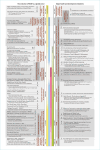Water, sanitation and hygiene (WASH): the evolution of a global health and development sector
- PMID: 39366708
- PMCID: PMC11459319
- DOI: 10.1136/bmjgh-2024-015367
Water, sanitation and hygiene (WASH): the evolution of a global health and development sector
Abstract
Despite some progress, universal access to safe water, sanitation and hygiene (WASH) by 2030-a remit of Sustainable Development Goal 6-remains a distant prospect in many countries. Policy-makers and implementers of the WASH sector are challenged to track a new path. This research aimed to identify core orienting themes of the sector, as legacies of past processes, which can provide insights for its future. We reviewed global policy, science and programmatic documents and carried out 19 expert interviews to track the evolution of the global WASH sector over seven decades. We situated this evolution in relation to wider trends in global health and development over the same time period.With transnational flows of concern, expertise and resources from high-income to lower-income countries, the WASH sector evolved over decades of international institutionalisation of health and development with (1) a focus on technologies (technicalisation), (2) a search for generalised solutions (universalisation), (3) attempts to make recipients responsible for environmental health (responsibilisation) and (4) the shaping of programmes around quantifiable outcomes (metricisation). The emergent commitment of the WASH sector to these core themes reflects a pragmatic response in health and development to depoliticise poverty and social inequalities in order to enable action. This leads to questions about what potential solutions have been obscured, a recognition which might be understood as 'uncomfortable knowledge'-the knowns that have had to be unknown, which resonate with concerns about deep inequalities, shrinking budgets and the gap between what could and has been achieved.
Keywords: Global Health; Hygiene; Prevention strategies; Public Health.
© Author(s) (or their employer(s)) 2024. Re-use permitted under CC BY-NC. No commercial re-use. See rights and permissions. Published by BMJ.
Conflict of interest statement
Competing interests: None declared.
Figures



References
-
- WHO/UNICEF Joint Monitoring Programme for Water Supply Sanitation and Hygiene (JMP) Progress on household drinking water, sanitation and hygiene 2000-2022. 2023. https://washdata.org/reports/jmp-2023-wash-households Available.
-
- UNWater . United Nations; 2021. SDG6 update: the world is off-track.https://www.unwater.org/sdg6-update-the-world-is-off-track Available.
-
- Luby SP, Rahman M, Arnold BF, et al. Effects of water quality, sanitation, handwashing, and nutritional interventions on diarrhoea and child growth in rural Bangladesh: a cluster randomised controlled trial. Lancet Glob Health. 2018;6:e302–15. doi: 10.1016/S2214-109X(17)30490-4. - DOI - PMC - PubMed
Publication types
MeSH terms
LinkOut - more resources
Full Text Sources
Medical
Miscellaneous
